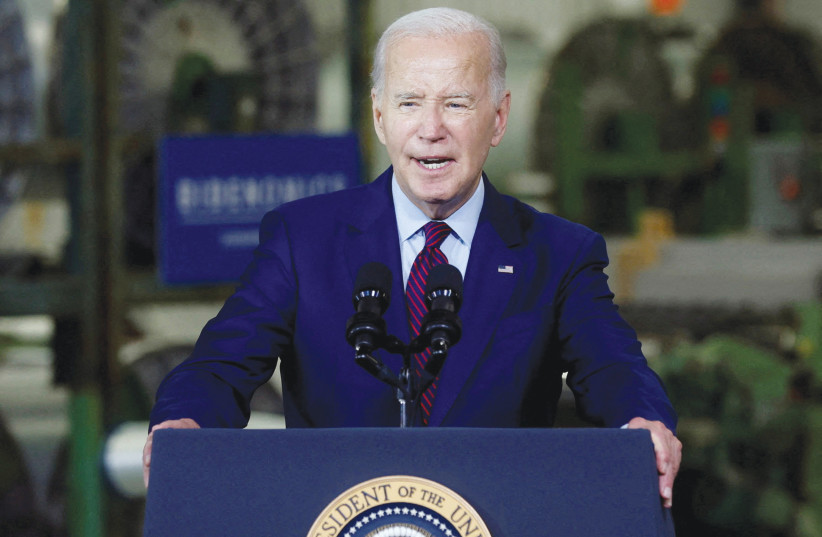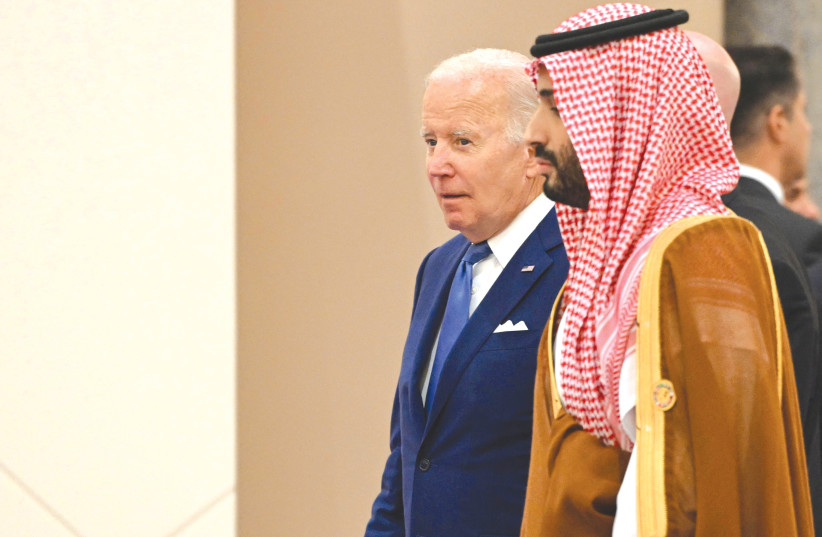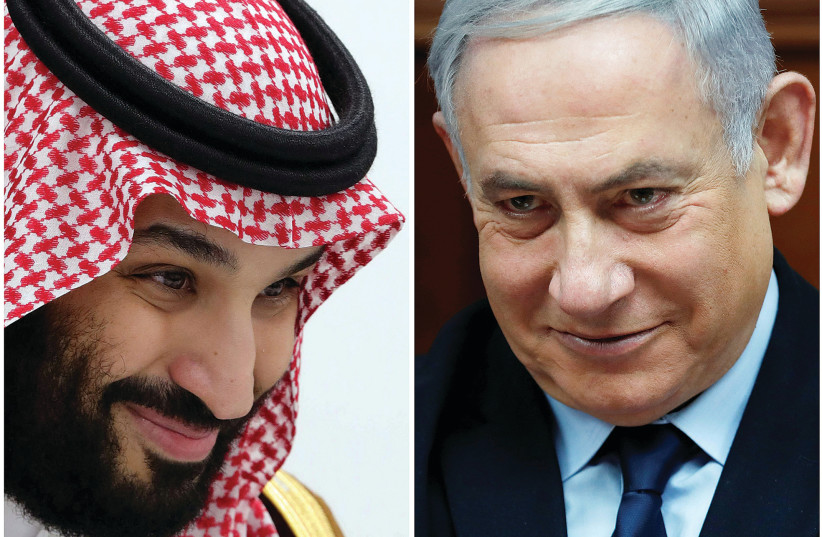A deal between Israel and Saudi Arabia would effectively be a ginormous step forward in ending the Israel-Arab conflict.
MICAH HALPERNAUGUST 7, 2023 02:35

Speaking metaphorically, a deal between Israel and Saudi Arabia would be the jewel in the crown for the Abraham Accords.
Speaking practically – and tactically, a deal between Israel and Saudi Arabia would effectively be a ginormous step forward in ending the Israel-Arab conflict.
There are rumors, there are press reports, there are statements from interested partners scattered near and far. And The New York Times’ Thomas Friedman is, once again, out in front explaining what he thinks will happen.
Following a sit-down with US President Joe Biden, Friedman wrote up his impressions and prognostications. They come with a caveat. Friedman has a long and trusted relationship with Biden. Friedman is probably one of Biden’s closest unofficial advisers on foreign policy.
And Friedman’s column in The New York Times following that meeting – a column in which he shares his reservations and the many potential pitfalls to be navigated, lays out a very complicated path to a Saudi/Israel deal.
 US PRESIDENT Joe Biden and Saudi Crown Prince Mohammed bin Salman in Jeddah, last July: Saudi Arabia is not able to give up the American defensive shield, and believes Israel has a role in securing this. (credit: MANDEL NGAN/REUTERS)
US PRESIDENT Joe Biden and Saudi Crown Prince Mohammed bin Salman in Jeddah, last July: Saudi Arabia is not able to give up the American defensive shield, and believes Israel has a role in securing this. (credit: MANDEL NGAN/REUTERS)According to Thomas Friedman – and remember, he is one of Biden’s besties – the biggest obstacle to a Saudi-Israeli deal seems to be that Biden is still not committed to a Saudi-Israeli deal.
Friedman describes the potential deal, the deal almost in the making, as a quadrilateral deal. A deal between the United States, Saudi Arabia, Israel, and the Palestinians. And that’s just one of the problems in the deal as described, as envisioned, and as dissected, by Thomas Friedman.
And it is the only glimpse we have into the thinking of the president of the United States, who, on this issue, has remained closed-lipped.
There are so many other problems with the plan. For example: Saudi King Salman, is virtually retired at the age of 87. The king has repeatedly and publicly said that there will be no deal with Israel until the Palestinian issue is resolved.
Salman is now out of the public eye. He has handed over operational control of the kingdom to his son, Prince Mohamed bin Salman. Practically the only public sentiment expressed by the king since the Abraham Accords were announced on August 13, 2020, is this: No deal with Israel until the Palestinian issue is resolved.
In other words, the Palestinian issue and all it implies is very important to King Salman. But the Saudi monarch is old school. That sentiment runs counter to new conventional wisdom which is that Arab and Muslim leadership, including the now-ruling son of King Salman, namely Prince Bin Salman, have lost their patience with the Palestinians.
And that is at the core of why the Palestinians were, and still are, against the Abraham Accords. Prior to the Abraham Accords, the Palestinian issue placed them and their conflict with Israel at the center of everything in the Middle East.
The Abraham Accords proved that there is a seismic shift in attitudes. The Abraham Accords proved that Arab leaders were willing to view relations with Israel in a more nuanced and stratified manner.
The Abraham Accords proved that these leaders could separate the Palestinian/Israeli conflict, could separate the Palestinian issue from their own needs, wants, and hopes, and work together with the Jewish state on issues of mutual benefit that were easily within their reach.
Meanwhile, the United States has needs of its own. The US needs the Saudis to inject money – quite a lot of money, into Palestinian infrastructure to help them build a state. More importantly, the US needs the Saudis to slow – even stop, their overtures to China.
And most importantly, the US needs the Saudis to sign an agreement with Israel. This is where Friedman’s insight into Biden’s lack of commitment is important.
Biden/Friedman know that a Saudi deal with Israel, signed by Prime Minister Benjamin Netanyahu, is a gargantuan prize. A prize that would secure Netanyahu a position of splendor in history books, not a position tarnished by corruption and trials. Biden/Friedman know that when push comes to shove, Netanyahu is a politician, not an ideologue.

A COMPOSITE of Saudi Arabia’s Crown Prince Mohammed Bin Salman and Prime Minister Benjamin Netanyahu. Talks of an alliance between Israel and Saudi Arabia came at a time of increased contact between Israel and Arab states, with varying levels of concerns about Iran. (credit: SPUTNIK/MIKHAIL KLIMENTY/REUTERS AND RONEN ZVULUN/REUTERS)
They know that his most important goal is personal – it is to stay in power. They reason that Netanyahu will compromise on issues relating to Palestinian statehood.
But his coalition partners to his right will not compromise. And his government will fall. Biden/Friedman hope that the moderates in the opposition will jump forward to save Netanyahu and his government in the name of peace with Saudi Arabia. They perceive that the Saudi deal is that important.
Underestimating the Israeli opposition to Netanyahu
And that is a huge mistake. Biden/Friedman wrongly think that opposition to Netanyahu is centered on corruption trials. That is so very wrong. That is only a sliver of a much larger issue of their “anyone but Bibi” stance.
Biden/Friedman do not realize how deep the antipathy within Israeli opposition is toward Bibi Netanyahu as a person and as a leader. Almost all the heads and major players in the opposition were one-time protegés of Netanyahu.
They do not realize that had someone else been the leader of the Likud party, the governing coalition would be at least 80 members strong. The only parties outside the coalition would be Arab parties and the marginal parties on the edges of the political spectrum.
One of my jobs is to predict what will happen. I do that by assessing situations, applying historical data, by looking at what is transpiring in public, and what is probably happening behind closed doors.
There is no doubt that Israel would like a deal with Saudi Arabia, any deal with Saudi Arabia. But the coalition partners will not permit compromise – and deals require compromise.
I do not see a Saudi/Israeli deal in the near future.
I do see tiny steps, secret exchanges of defense and intelligence information. I see secret technical and medical exchanges of information. All these may lead to a deal – but down the road. Not now.
The writer is a columnist and a social and political commentator. Watch his TV show Thinking Out Loud on JBS. Read his latest book
Content retrieved from: https://www.jpost.com/opinion/article-753894.